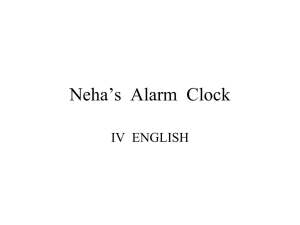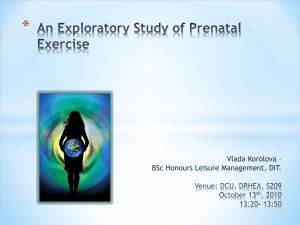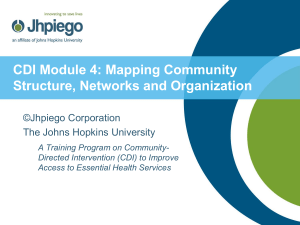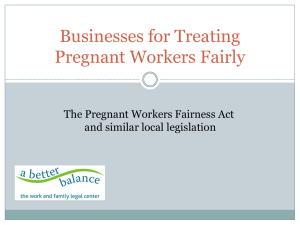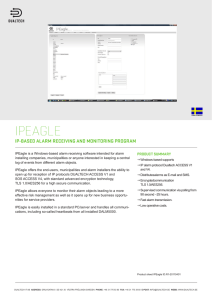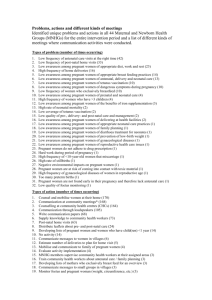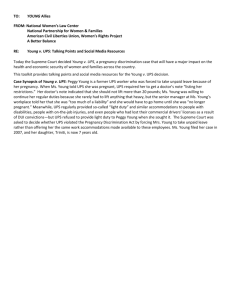Probability problems B – answers
advertisement
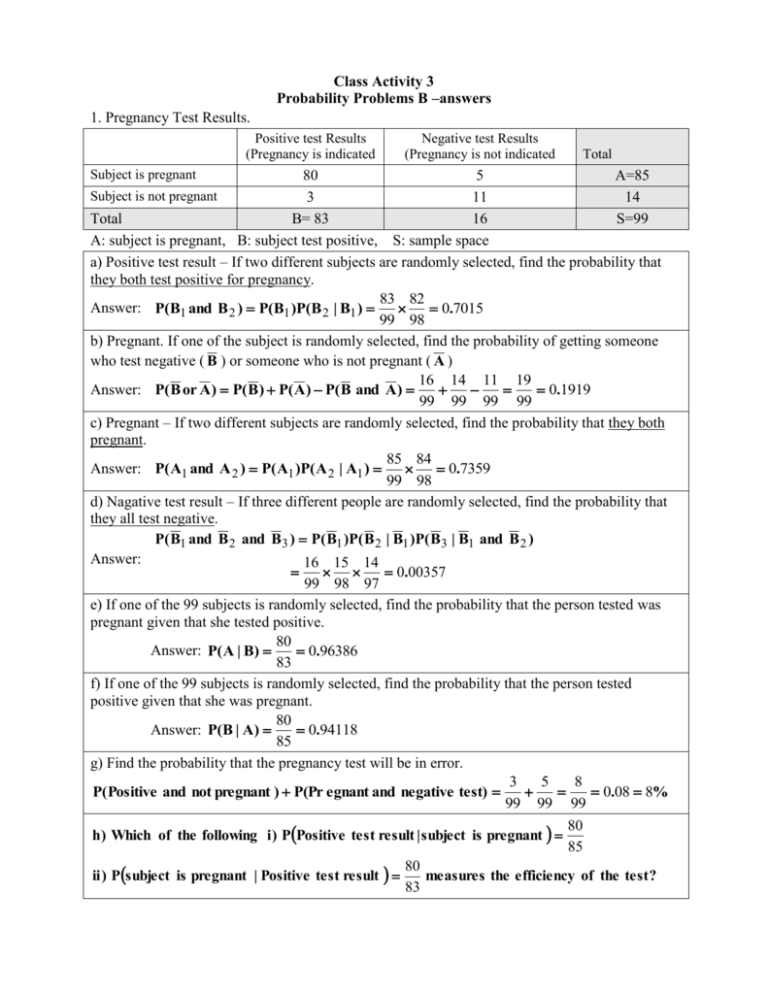
Class Activity 3 Probability Problems B –answers 1. Pregnancy Test Results. Positive test Results (Pregnancy is indicated Subject is pregnant Negative test Results (Pregnancy is not indicated Total 80 5 A=85 Subject is not pregnant 3 11 14 Total B= 83 16 S=99 A: subject is pregnant, B: subject test positive, S: sample space a) Positive test result – If two different subjects are randomly selected, find the probability that they both test positive for pregnancy. 83 82 Answer: P(B1 and B 2 ) P(B1 )P(B 2 | B1 ) 0.7015 99 98 b) Pregnant. If one of the subject is randomly selected, find the probability of getting someone who test negative ( B ) or someone who is not pregnant ( A ) 16 14 11 19 Answer: P( B or A) P( B ) P( A) P( B and A) 0.1919 99 99 99 99 c) Pregnant – If two different subjects are randomly selected, find the probability that they both pregnant. 85 84 Answer: P( A1 and A 2 ) P( A1 )P( A 2 | A1 ) 0.7359 99 98 d) Nagative test result – If three different people are randomly selected, find the probability that they all test negative. P( B1 and B 2 and B3 ) P( B1 )P( B 2 | B1 )P( B3 | B1 and B 2 ) Answer: 16 15 14 0.00357 99 98 97 e) If one of the 99 subjects is randomly selected, find the probability that the person tested was pregnant given that she tested positive. 80 Answer: P( A | B) 0.96386 83 f) If one of the 99 subjects is randomly selected, find the probability that the person tested positive given that she was pregnant. 80 Answer: P(B | A) 0.94118 85 g) Find the probability that the pregnancy test will be in error. 3 5 8 P( Positive and not pregnant ) P(Pr egnant and negative test) 0.08 8% 99 99 99 80 h ) Which of the following i ) PPositive test result | subject is pregnant 85 80 ii ) Psubject is pregnant | Positive test result measures the efficiency of the test ? 83 2. Redundancy. Assuming that your alarm clock has 0.975 probability of working on any given morning. Let F: alarm clock fails to work a) What is the probability that your alarm clock will not work on the morning of an important exam? P(F)= P( your alarm clock will not work) = 1 – P(your alarm clock will work) = 1 – 0.975 = 0.025 b) If you had two such alarm clocks, what is the probability that they both fail on the morning of an important final exam? P(F1 and F2 ) P(F1 ) P( F2 ) (0.025)(0.025) 0.000625 c) With one alarm clock , we have a 0.975 probability of being awakened. What is the probability of being awakened if we are using two alarm clocks? P( F1 or F2 ) P( F1 ) P( F2 ) P( F1 and F2 ) 0.975 0.0925 (0.975) (0.0925) 0.999375 3. In which of the following cases are events A and B independent? Answer a) P(A) = 0.3, P(B) = 0.8 and P(A and B) = 0.24 a) b) P(A) = 0.42, P(B) = 0.35 and P(A and B) = 0.145 b) c) P(A) = 0.8, P(B) = 0.5 and P(A or B) = 0.9 c) d) d) Event A Not A B 0.42 Not B 0.6 0.3 1 4. Counting techniques a) 6! = 6(5)(4)(3)(2)(1) = 720 b) 15! = (15)(14)(13)(12) . . .(3)(2)(1) = 1,307,674,368,000 25! 25(24)( 23! ) 100! c) 25 P2 24(23) 552 c) 100 P3 100(99)(98) 970200 23! 23! 97! c) 25 C 2 25! 25( 24)( 23! ) 24( 23) 552 276 23! 2! 23! 2 2 c) 100 C 3 100! 100(99)(98) 161700 3! 97! 3( 2)(1)
